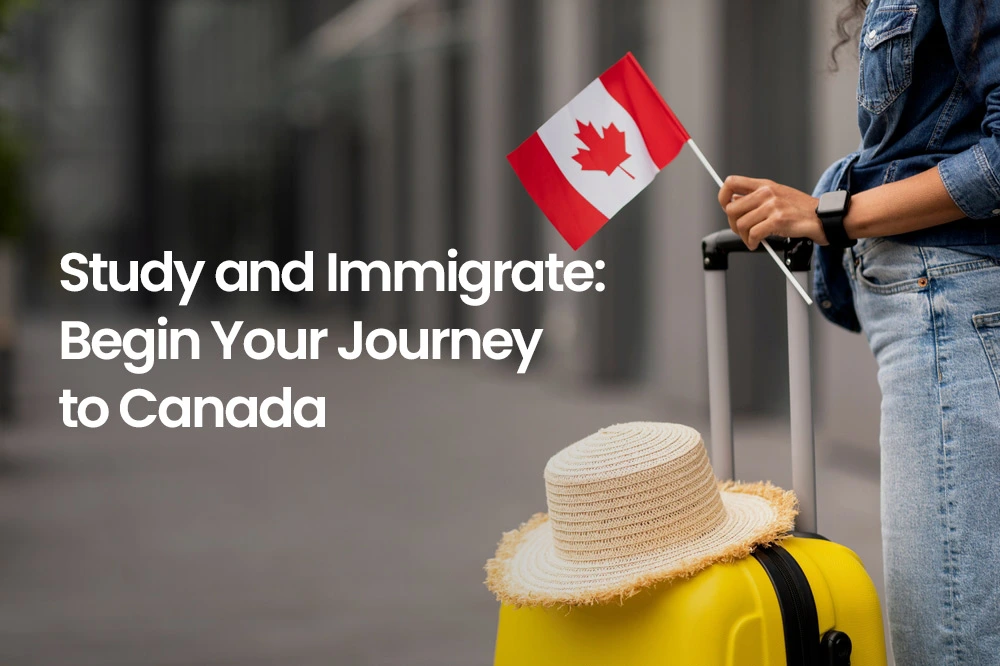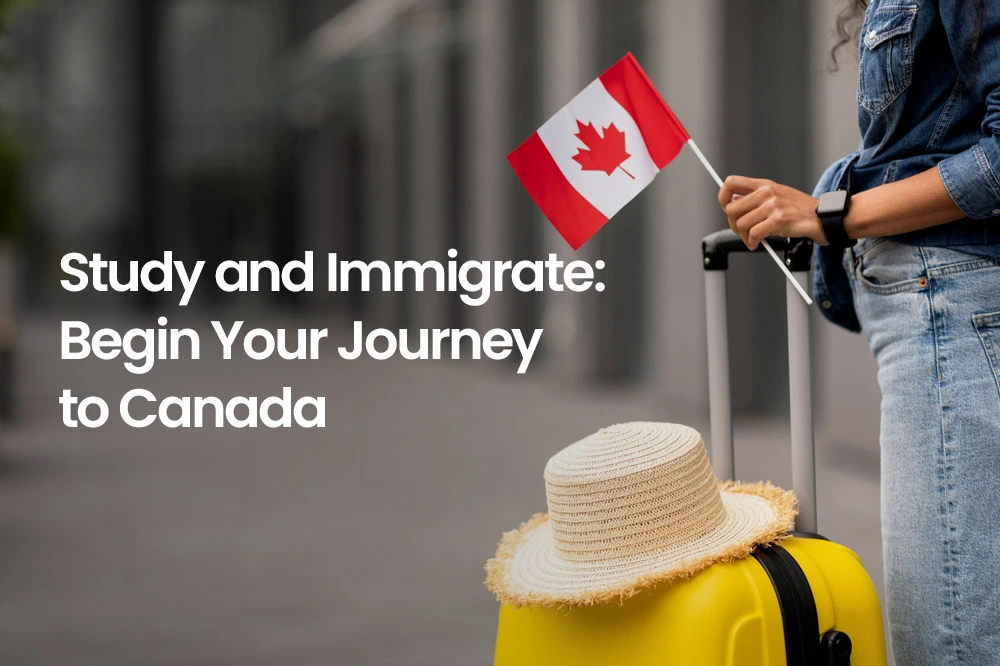


Canada has become a hub for international students, with a thriving community of over 800,000 students from various corners of the world. Its reputation as an ideal destination for study, work, and immigration has led to a threefold increase in its international student population in the last decade.
3 Steps to Study in Canada
The process of studying in Canada involves three key steps.
1. Choose an Academic Program
Select a suitable academic program aligned with your educational goals.
2. Apply to a Designated Learning Institution
Submit your application to the chosen Designated Learning Institution (DLI) for your selected program. Obtain a Letter of Acceptance (LOA) from the institution confirming your admission.
3. Apply for Study Permit
A study permit is an indispensable document that most individuals require to maintain legal status as students in Canada. Apply for a study permit to pursue education in the welcoming and diverse Canadian landscape.
Studying in Canada has many benefits, making it a premier destination for international students worldwide. The factors that collectively contribute to Canada's appeal as a top choice for those seeking a quality education and a promising future include:
Canada welcomes international students, encouraging exploration of educational avenues and post-graduation opportunities with over 1,500 Designated Learning Institutions (DLIs) authorized by Immigration, Refugees and Citizenship Canada (IRCC). DLIs facilitate international students' education in Canada and support their stay after graduation. As the list of DLIs authorized by IRCC continues to grow, it is advisable to verify the authorization status of your selected university, college, or institution on the official website of the Canadian government.
In Canada, Ontario and Quebec, the most populated provinces, have the most DLIs, totaling almost 1,000. There are many DLIs in the country, so you can find a program that fits what you are looking for.
Canada is home to about 150 community colleges that provide quality education. Unlike universities focusing on theory and specialized professions like medicine or engineering, community colleges offer practical training for quicker integration into the job market. These programs are designed to help students find work in their field. Similar to universities, colleges in Canada maintain comparable education standards. International students can feel confident studying at a Canadian college, as the credentials earned will support their professional and immigration goals after graduation.
International students completing post-secondary education in Canada find numerous opportunities to extend their stay and move toward permanent residence. Canadian education provides a valuable advantage in pursuing PR, as both federal and provincial immigration programs highly value candidates with a Canadian academic background and work experience.
Upon completing your education, acquiring a Post-Graduation Work Permit (PGWP) allows you to gain up to three years of Canadian work experience, depending on your academic program. With a PGWP, you can explore various federal and provincial programs leading to PR, further enhancing your prospects in Canada.
Express Entry is Canada's primary immigration system, managing applications based on factors like age, education, work experience, and language skills. To initiate the process, individuals must create an Express Entry profile showcasing their qualifications for immigration to Canada.
Candidates are assessed using the Comprehensive Ranking System, favouring youth, Canadian education, work experience, and language skills. Attaining high CRS scores enhances eligibility for permanent residency. Express Entry draws select candidates with top scores, significantly influencing their chances of obtaining PR status in Canada. Through Express Entry, international students may qualify for the Canadian Experience Class (CEC) program, offering a pathway to PR for thousands annually.
PNP is a Canadian immigration initiative where provinces and territories nominate individuals for permanent residency based on local economic needs and specific criteria. These specialized streams acknowledge the valuable contributions and skills that former international students bring to the provinces, promoting their integration into the Canadian workforce and community.
Each province in Canada has its own distinct Provincial Nominee Program, tailoring immigration initiatives to address unique regional needs and opportunities. For instance, the Ontario Immigrant Nominee Program (OINP) and the Saskatchewan Immigrant Nominee Program (SINP) are specific PNPs designed to address their respective provinces' diverse economic and labour market demands.
Quebec's immigration approach is different from that of other provinces. The Quebec Experience Program supports former international students transitioning smoothly to permanent residency within the province. As Canada's second-largest province, Quebec, especially Montreal, attracts numerous international students, offering programs separate from federal initiatives and PNPs.
The Atlantic Immigration Program is a federal initiative designed to help skilled foreign workers and international students who have finished their education in Canada. Atlantic immigration program offers them the opportunity to settle permanently and find employment in one of Canada's four Atlantic provinces: Nova Scotia, New Brunswick (NB), Prince Edward Island (PEI), or Newfoundland and Labrador (NL). It serves as a pathway for eligible individuals to build their careers and establish long-term residences in these specific regions of Canada. However, a valid job offer from a designated employer in any of Canada's Atlantic provinces is mandatory to be part of the program.
The Rural and Northern Immigration Pilot (RNIP) is a Canadian immigration program designed to address labour shortages in rural communities. RNIP collaborates with the Canadian government, small communities in Ontario, Western Canada, and territories to attract and retain foreign workers. Driven by communities, the RNIP empowers them to lead in welcoming new immigrants, matching them with local jobs, fostering community integration, and connecting newcomers with established community members and local settlement services. The program provides immigrants with an opportunity to obtain Canadian PR.
1. How can I study in Canada?
First, choose your preferred program, apply to a Canadian designated learning university or college, get a Letter of Acceptance, and finally, apply for a study permit from the Canadian government.
2. Which Canadian city is best for international students?
The best city depends on personal preferences. However, popular choices include Toronto, Vancouver, and Montreal.
3. How can I stay in Canada after my studies?
If you are a Post-Graduation Work Permit (PGWP) holder, you may apply for PR through the Express Entry system, specifically the Canadian Experience Class (CEC) stream, or explore Provincial Nominee Programs (PNPs) that may align with your qualifications and work experience in a specific province.
4. Can I bring my family to Canada? If so, how?
Yes, you can bring your family members. They need to apply for the appropriate visas, such as a visitor visa or work permit.
5. What is a Post-Graduation Work Permit (PGWP)?
A PGWP is a permit that enables international students who have completed a program of study in Canada to work for a certain period, depending upon the duration of the program.
6. How to qualify for a Post-Graduation Work Permit (PGWP)?
You must complete a program at a DLI and apply within a specific timeframe.
7. Can I work while studying in Canada?
Yes, international students in Canada are generally allowed to work part-time during their studies and full-time during scheduled breaks.
8. Are scholarships available for international students in Canada?
Many Canadian universities and institutions offer scholarships to international students based on academic achievements and other criteria.
9. What is the required fund for studying in Canada?
The amount varies, but you must show proof of funds to cover tuition, living expenses, and other costs when applying for a study permit.
10. Is there any age limit to study in Canada?
There is no specific age limit for studying in Canada, but you must meet the admission requirements of the institution you apply to.
11. Is a language test required for study permit applications in Canada?
Yes, most applicants need to take a language proficiency test to demonstrate their English or French language skills.
12. What are the Language tests in Canada?
Language proficiency tests include IELTS or TOEFL to prove your English or French language skills.
13. How long does it take to get a study permit?
Processing times vary, but it usually takes a few weeks to months to obtain a study permit after submitting a complete application.
14. Is knowledge of French necessary for living in Quebec, Canada?
Yes, having proficiency in French is often beneficial for living in Quebec, as it is the official language and being bilingual can enhance your experience and opportunities in the province.
15. What are DLIs in Canada?
Designated learning institutions are schools approved by the Canadian government to host international students, and you must enrol in one to be eligible for a study permit.
16. Can I create an Express Entry (EE) profile from India?
Yes, you can create an Express Entry profile from India. The Express Entry system allows individuals to submit their profiles online, regardless of their current location.
17. Do Canadian Provincial Nominee Programs (PNPs) have streams favouring former international students?
Yes, many PNPs in Canada offer dedicated streams or incentives for former international students, encouraging their contribution to the local economy and community.
18. What is the new financial requirement for international applicants?
Starting January 1, 2024, international students must demonstrate funding sources of CAD 20,635 annually for their stay in Canada.
19. What are the new off-campus work rules for students in Canada?
Study permit holders in Canada studying full-time (or part-time in their final academic semester) at a Designated Learning Institution (DLI) can work more than 20 hours per week off campus.
20. Is Canada considered immigrant-friendly?
Yes, Canada is widely regarded as immigrant-friendly, with inclusive immigration policies, diverse communities, and programs that facilitate the integration of newcomers.
Our experienced team at ImmiLaw Global comprises immigration lawyers and overseas study experts. We assist in selecting study programs and pathways to permanent residency, ensuring a seamless transition toward your educational and immigration goals. Contact ImmiEd Global for further assistance regarding the study and migration process to Canada.
The information in this article is general and should not be construed as professional, legal, or financial advice. For specialized help, consult a professional advisor. Although we strive for precision, we cannot promise total accuracy. Over time, the author's opinions could change. ImmiEd Global and its affiliates do not explicitly or implicitly endorse third-party advice, opinions, information, products, or services.
Feel free to contact us for your queries.
Read To Know: Beware of Fake Canadian Study – Admission Offers!